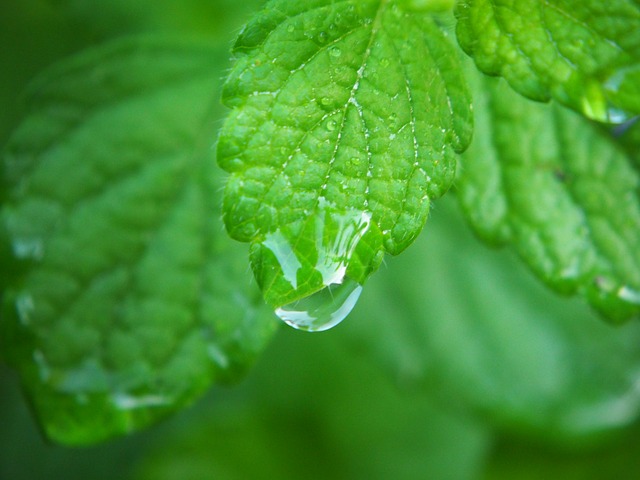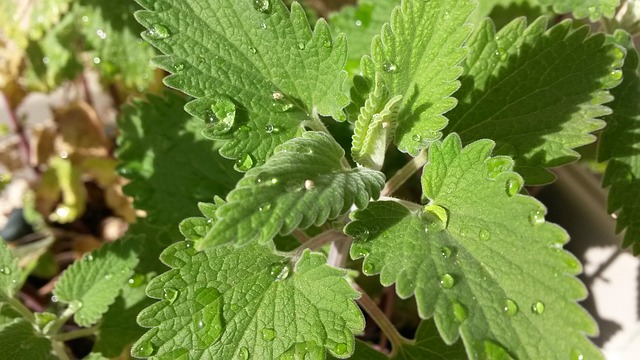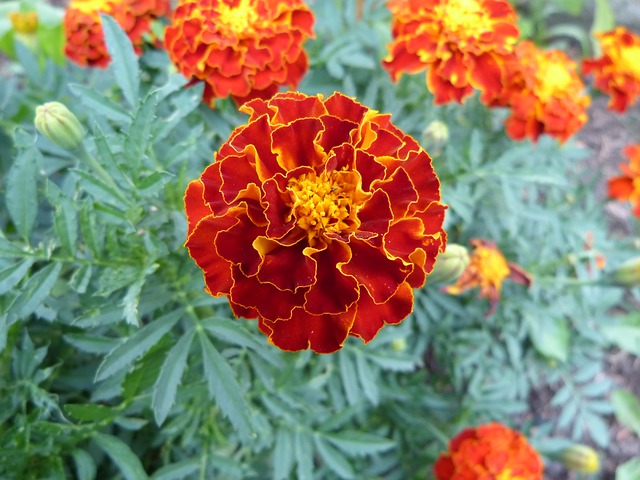Warming temperatures, rainy-sunny-rainy days, lush green grass, spring dandelions, daffodils, hyacinths, and tulips…
What’s next?
Mosquitos.
[pullquote]We’re incredibly fortunate in Essex to have very few mosquitos… But from time-to-time the noisome bloodsuckers nevertheless find us.[/pullquote]
We’re incredibly fortunate in Essex to have very few mosquitos. Perhaps it’s the omnipresent breeze wafting across Lake Champlain. But from time-to-time the noisome bloodsuckers nevertheless find us. And when they do, it’s pretty tempting to pull out the mosquito repellent and spray, spray, spray. Noxious chemicals replace obnoxious pests.
Did you know that some plants naturally repel mosquitos? Today’s gardening tip offers a clever, attractive, and—in many cases—tasty way to eliminate (or at least reduce) dangerous poisons.
One of the best ways to stave off the whiny insects is to eliminate stagnant water. Mosquitoes can lay their eggs in even the shallowest puddles, so prevent water from collecting and you’ll dramatically curb your mosquito population.
Now it’s time to add the following naturally mosquito repellent plants to your garden and landscaping.
Citronella Grass

Known for its distinct smell, citronella grass is the most commonly used natural ingredient in mosquito repellants. (Source: Garden Design)
Perhaps the most popular naturally mosquito repellent plant, citronella grass might not be what you’re looking for.
First of all, it is the oil present in this lemony plant that deters mosquitos. Once extracted it is added to natural “bug dope” and patio candles to organically deter the pesky blood-letters. But, unless you intend to actually crush up citronella grass leaves and rub them on your skin, you’re not likely to see any notable improvement in your mosquito conditions simply by growing a citronella grass.
Second, citronella grass is native to zones 10, 11, and 12. So, northern readers, unless you’re happy to plant citronella grass as an annual, you’re probably better to choose alternative naturally mosquito repellent plants for your garden.
In addition to its mosquito repelling properties, the plant is also used to treat lice and other parasites, like intestinal worms. (Source: Gardening Know How)
Basil

Basil is another pungent plant that can serve you well as a natural mosquito repellent.
Basil emits its aroma without crushing the leaves, so you can grow basil in pots and put them in your backyard to control mosquitoes. To keep the mosquitoes away from your body, rub a handful of crushed basil leaves on your skin. (Source: NatureHacks)
What kitchen garden isn’t improved with a couple of basil varieties? It’s the perfect summer addition to your salads, gazpacho, and cold pasta dishes.
Any variety of basil can repel mosquitoes but it is advisable to use lemon basil, cinnamon basil, and Peruvian basil since they have the strongest fragrances. (Source: NatureHacks)
Garlic

And while I’m thinking of summer salads, gazpacho, and pasta dishes, there’s another obvious mosquito repellent plant to mention, garlic.
Garlic actually repels mosquitoes, but not from garlic breath. If you have a high allicin (garlic’s active anti-microbial ingredient) blood count, mosquitoes will refuse to engage with your blood… In order to release garlic’s healing properties, it should be crushed and then eaten. (Source: NaturalNews.com)
Sounds interesting. According to conventional wisdom, the garlic bulb—once crushed and ingested—makes our blood toxic (or at least unpalatable) to mosquitos. Perfect! Except, the supporting science is pretty thin.
Garlic, perhaps because of its strong odor, has long been said to be that magic food. But studies so far have found that claim to be little more than wishful thinking. Eating it may repel other humans, but apparently not mosquitoes.
One study illustrating this was published in 2005 by a group of researchers at the University of Connecticut Health Center. The scientists asked groups of subjects to consume large amounts of garlic on some days and a placebo on others and exposed them to mosquitoes on each day. The number of mosquitoes that fed on them and the number of bites they suffered did not seem to differ under the two conditions.
[…]
Eating garlic has not been shown to either attract or ward off mosquitoes. (Source: The New York Times)
So, should you plant garlic? Of course. It’s delicious, and it all sorts of additional healthy benefits. And perhaps one day we’ll learn that it is the ultimate mozzy buster too.
Peppermint

Another oft touted organic mosquito repellent is peppermint. This delightful smelling (and tasting) garden regular is apparently repugnant to mosquitos.
Oil of Mentha piperita L. (Peppermint oil), a widely used essential oil, was evaluated for larvicidal activity against different mosquito species… The oil showed strong repellent action against adult mosquitoes when applied on human skin. (Source: Bioresource Technology)
It’s worth noting that simply growing peppermint in your garden won’t eliminate your mosquitos. Similar to the citronella grass and, well, just about everything else in this list, peppermint leaves must be crushed and rubbed on the skin.
And while you’re at it, you might consider muddling a few peppermint leaves in your drink!
Additionally, if you do get a bug bite you will find that peppermint oil is effective at relieving itches. (Source: Mosquito Magnet)
Lavender

Growing lavender is fun and has many uses including as a mosquito repellent and it’s a lot more pleasant to smell than some of the other options. If you don’t want to grow it you can purchase lavender soaps, essential oils, and lotions to use as mosquito repellent.
Have you ever noticed that insects or even rabbits and other animals have never decimated your lavender plant? It is because of their lovely fragrance, which comes from its essential oils that are found on the leaves of the plant. It is even argued that lavender oil hinders a mosquito’s ability to smell! This plant is very tough and drought-resistant once established, and only needs full sun and good drainage. And while it can endure many climates, it thrives in warmer areas. (Source: Garden Design)
If you do want to make your own simple lavender concoction to repel mosquitoes for use on your skin get some tips below.
To make a chemical-free mosquito solution, just mix lavender essential oil in water and apply directly on your skin. To control mosquitoes, keep the lavender plant pots around seating areas on your patio, backyard and garden. You can ensure yourself of blissful evenings. (Source: NatureHacks)
Rosemary

You can boil a cup of dried rosemary in a quart of filtered water for 20 minutes, and then strain into another quart of filtered water. Pour into individual spray bottles, to use when going outside where mosquitoes might be. Be sure to store unused portion in the fridge.
Another great mosquito repellent is rosemary. Both the New York Botanical Garden and PlantShed recommended this plant. Rosemary is an herb that many of us are very familiar with and their woody scent is exactly what keeps mosquitoes as well as cabbage moths and carrot flies away. They do best in hot and dry climates and thrive in containers, which may be ideal for areas with winters. They can also be pruned into all sorts of shapes and sizes and make great borders or decorations. While the pests stay away you can enjoy the herb’s scent and also use it to season your cooking. (Source: Garden Design)
Speaking of cooking, when barbecuing add some sprigs of rosemary to the grill and the wafting scent will keep mosquitoes out of the yard while you cook!
In addition, rosemary is another plant that can also be used as the main ingredient in a repellent you can create to use on your skin.
To control mosquitoes in warmer months, place rosemary plant pots in the yard. To make a skin-friendly rosemary mosquito repellant, mix 4 drops of rosemary essential oil and ¼ cup of olive oil and store it in a cool & dry place. Apply as needed on your skin. (Source: NatureHacks)
Lemon Balm

This also smells a lot better than citronella or garlic and works well too. All you have to do is take the leaves and crush them and rub them on your body where skin will be exposed.
Lemon balm also keeps the mosquitoes at bay as its leaves contain citronella compounds in large amounts. The citronella plant is popularly used in commercial mosquito repellants and there is up to 38% citronella content in some varieties of lemon balm. You can grow lemon balm in your garden and allow them to proliferate, leaving less room for mosquitoes to thrive. To keep mosquitoes at bay, you can also rub crushed lemon balm leaves on your skin. (Source: NatureHacks)
Although the scent of this plant is pleasant and helps keep those irritating mosquitoes away it can take over your garden.
Lemon balm happily thrives in sun or partial shade, and should be kept in moist, well-drained soil. Keep in mind though that, like other mints, lemon balm is invasive, and it will spread and take over your garden like a weed if you let it. For that reason, it’s best to keep it contained in a pot. (Source: The Gerson Institute)
Catnip

There are some studies that show that catnip oil is better at repelling mosquitoes than harsh chemical insect repellents. If this is true, you should try it. You can buy it already made catnip oil repellent or make your own catnip mosquito repellent. It works on other types of pests too.
Catnip (catmint) can be found thriving almost anywhere. It is from the mint family and grows abundantly both as a commercial plant and as a weed. It is very easy to take care of and may even start to invade other areas of your garden. However, if you are willing to forgo this plant’s insidious nature, they are amazing mosquito repellants and another recommendation from the BBG. In a study at Iowa State University, catmint was found to be ten times more effective than DEET, the chemical used in most insect repellants. (Source: Garden Design)
You may also attract some cats who will enjoy the catnip treat and release the natural aroma of the catnip for you if you grow the plant near your home in area you would like to repel mosquitoes.
Besides being an eccentric choice for cat lovers due to its ability to put our feline pets in a euphoric state, catnip has the ability to repel mosquitoes as a member of the mint family. Simply grow catnip near the backyard or patio of your house. Cats love the aroma of catnip put catnip leaves around your household for them to crush and eat, thereby releasing its fragrance to ward off mosquitoes. You can also crush fresh leaves then rub it all around your skin. (Source: NatureHacks)
Marigolds

Most people who grow vegetables tend to plant marigolds within, and for good reason. These magical flowers help banish many types of insects including mosquitoes. Of course, the smell is usually not that pleasant to humans either, but they’re not hard to look at or grow.
Marigolds, an easy-to-grow annual flower, emit a smell that deters mosquitoes. Grow them in pots and place them near your patio or entrance to your home to keep bugs out. Marigolds are also a popular addition to borders and vegetable gardens. According to NYBG, not only can they keep away mosquitoes, but they also dissuade aphids, thrips, whiteflies, Mexican bean beetles, squash bugs, and tomato hornworms. (Source: Garden Design)
How do marigolds deter insects? They actually have a compound used in many commercial repellents.
Marigolds contain Pyrethrum, a compound used in many insect repellents. A “screened cage method” study examined the repellent action of essential oils derived from Marigolds and Myrtle compared to DEET and found that it demonstrated the protection time of 50% essential oils of marigold and myrtle were respectively 2.15 and 4.36 hours, compared to 6.23 hours for DEET 25%.(Source: Natural Living Ideas)
Geranium

Plant scented citronella geraniums to help control mosquitoes in pots to put around your patio and in areas that you and your guests might want to sit without being bothered by mosquitoes. You can also crush the leaves and add to lotions to help the repellent work even better.
Scented geraniums seem to be a popular mosquito repelling plant. Recommended by PlantShed, BBG, and NYBG, the favored scent seems to be lemon scented, which is reminiscent of citronella grass. They are beautiful blooms with a strong fragrance that keep several types of pests away. These fast growing plants like warm, sunny, and dry climates, but if you are in a cold climate area, they can be grown in planters with constant pruning. (Source: Garden Design)
Other sources claim the scented geraniums are ineffective as a repellent or only effective when crushed to release their scent.
What do you think of any of the plants listed here? Do you already grow any? What are your experiences with their mosquito-repellent properties?
Leave a Reply